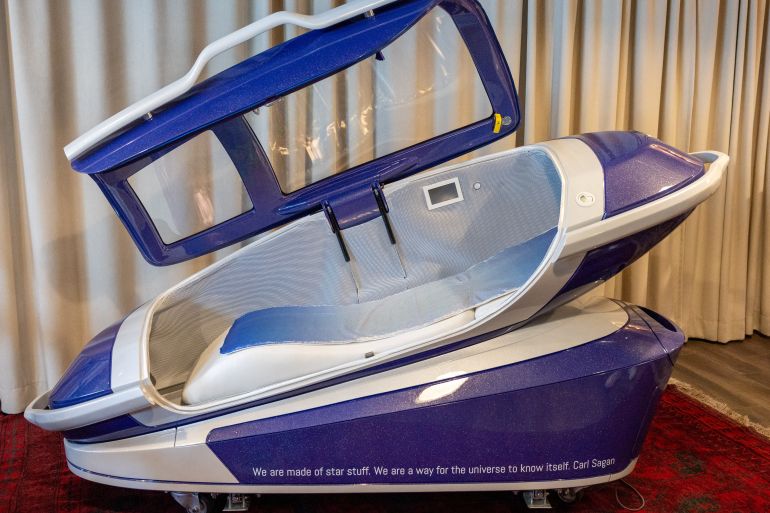Switzerland opens probe into use of suicide booth
Police have detained several people over the death of a woman in Sarco suicide capsule.
A view of the ‘Sarco’ suicide capsule, during a presentation in Zurich, Switzerland [Denis Balibouse/Reuters]Published On 24 Sep 202424 Sep 2024
Swiss police have launched an investigation after a woman died in a “suicide pod”.
Several people have been taken into custody and face criminal charges, the authorities announced on Tuesday. The action came after police learned that the Sarco suicide capsule had been used in a forest area the previous day.
Those detained are suspected of “inducement and aiding and abetting suicide,” regional police said in a statement.
The Last Resort, an assisted dying group, told AFP news agency that the person who died in the booth was a 64-year-old woman from the United States. She has not been named.
Swiss authorities secured the capsule and took the body of the deceased for an autopsy, according to police.
No going back
The controversial Sarco suicide capsule was developed by the Netherlands-based assisted suicide group Exit International.
First unveiled in 2019, the portable, human-sized, sealed pod allows those wishing to die to press a button. The oxygen inside it is then replaced with nitrogen, causing death by hypoxia. No medical supervision is needed.
“Once the button is pressed, the amount of oxygen in the air plummets from 21 percent to 0.05 percent in less than 30 seconds,” according to Exit International’s director Philip Nitschke.
“Within two breaths of air of that low level of oxygen, they will start to feel disorientated, uncoordinated and slightly euphoric before losing consciousness,” said the former physician from Australia who invented the capsule.
“They will then stay in that state of unconsciousness for … around about five minutes before death will take place,” he added.
As for someone changing their mind at the very last minute, Nitschke said: “Once you press that button, there’s no way of going back.”
Exit International Director Philip Nitschke attends a presentation of the Sarco suicide machine in Zurich, Switzerland, on July 17 [Denis Balibouse/Reuters]
Legal questions
The capsule has raised a host of legal and ethical questions in Switzerland. Active euthanasia is illegal in the country, but assisted dying has been allowed for decades as long as the person takes their life with no “external assistance” and those who help the person die do not do so for “any self-serving motive,” according to a government website.
Switzerland’s interior minister has said the “Sarco” pod does not comply with Swiss law.
“Firstly, it does not meet the requirements of product safety law and therefore cannot be placed on the market. Secondly, the corresponding use of nitrogen is not compatible with the purpose article of the chemicals act,” Elisabeth Baume-Schneider said in a parliamentary session on Monday.
In July, Swiss newspaper Blick reported that Peter Sticher, a state prosecutor in Schaffhausen, wrote to Exit International’s lawyers saying any operator of the suicide capsule could face criminal proceedings if it was used there.
Any conviction could trigger a sentence of up to five years in prison.
